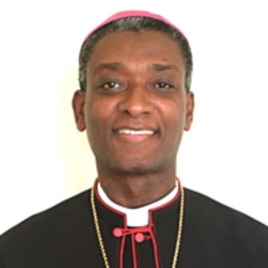In Haiti, MCC is helping give rural youth the chance
to complete vocational training
without leaving home.
By Linda Espenshade
Photographs by Silas Crews
When a 2010 earthquake destroyed the house where 16-year-old Rosie Tannis lived with
her aunt and uncle in Port-au-Prince, Haiti, it took not only her home but also her
plans to finish high school and study agronomy and languages at a university.
Tannis and thousands of others fled to the countryside in the next weeks to escape
chaos and tragedy in the capital, where houses had flattened like pancakes, trapping
people in the rubble for days. More than 1.5 million were left homeless and 200,000
people died — many of them victims of living in substandard housing in an overcrowded
city.
Tannis returned to her hometown of Desarmes, about 62 miles north of the capital.
Although her parents were no longer living, she had relatives who would take her in.
Over the next decade, she did well in school, especially in chemistry and physics.
After the earthquake, though, she and several hundred other young people from Desarmes
found themselves back home, with nowhere to develop the skills they had studied.
And they were the fortunate ones.
Yoline Jules lost three daughters in the earthquake. Today, she is vocal about the
need for better schools in all regions of Haiti so that youth can remain at home and
study. “If this was done already, many people that died wouldn’t have died,” she says.
In the aftermath of the earthquake, that sentiment was echoed by the Haitian government,
civil society groups and nongovernmental organizations, including MCC, who agreed
that a renewed effort to decentralize many services — including education — was essential
for the rebuilding of Haiti.
Since MCC already had a thriving reforestation program in Desarmes and almost three
decades of trust established there, MCC channeled 17 percent of its earthquake response
funding to create work opportunities, improve the water and sanitation systems and
strengthen educational opportunities in and around Desarmes.
In 2009, Groupe d’Accord Solidarité Action (
GASA), a group of Haitian professionals committed to empowering people in Desarmes through
education, reopened a technical school that had not offered classes in several years.
Located a half mile from the center of town, the school had one building with two
classrooms. Under
GASA, new programs in agronomy, plumbing and masonry began in fall 2009, drawing about
50 students the first year and 85 the second year.
To strengthen the capacity of the school, MCC applied for and received a $682,123
contribution from the Canadian government through the Department of Foreign Affairs,
Trade and Development Canada (
DFATD). MCC added $232,625. With these funds,
GASA, which also raises its own support, could improve its agricultural and building trades
programs and increase opportunities for women
.
GASA built four new workshops with eight additional classrooms; established programs in
electricity and mechanics; began offering instruction in computers, English and business
management for every student; and purchased a truck, outbuildings and animals for
the agronomy program, as well as land for an experimental garden.
A construction store and food-processing center were built and supplied, so that GASA
could sell products to support the school well into the future. In the initial five
months, those endeavors generated some $38,000, and the school expects that proceeds
will grow as the businesses become more established.
Enrollment during the 2011–2012 school year jumped to 229 students. In 2012–2013,
257 students were taking classes, about 150 of them people who had previously studied
in Port-au-Prince, including Tannis, who is enrolled in the school’s electrical program.
“Because I am in my native town and the school is here, I don’t have a reason to study
in Port-au-Prince,” Tannis says. Living in the capital would be more expensive, she says, and learning to be an electrician
allows her to use basic physics. Work as an electrician also may help finance further
study in civil engineering and electromechanics.
Tannis was one of only six young women enrolled in the construction trades in 2012–2013.
The more popular program of study for women is agronomy, where a third of the students
are female.
“Many of my friends were telling me not to enter into electricity because that’s a
trade for men,” Tannis says. “I said, ‘There’s nothing a man can do that a woman can’t.’”
Challenging gender roles and persuading women to enroll in the trades has been a goal
for the school administrator, Ramel Altidort. When he recruits in the community, he
emphasizes the economic value of having two wage earners in a family and offers tuition
breaks to get females to come.
GASA also runs a daycare at the school, so mothers with children can study.
Tannis tells her friends, “There’s a school here where you can come and learn about
something and maybe find a job after. You don’t have to depend on your parents or
family.”
That is the sort of vision that Altidort, the school’s administrator, was dreaming
of when he and others began the school. Altidort, who is from Desarmes, spent years
studying, including time in Boston, and teaching in Port-au-Prince and elsewhere in
Haiti. Now, inspired by Christ’s life and mission, he has committed to give the next
25 years of his life to making sure youth have a chance to learn and develop their
skills in Desarmes.
“We think real change will start with education,” Altidort says. “You need new leaders,
you need a new way of thinking and you need a new way of doing things. The best way
is to prepare them. Then they will take charge of their community, their family and
themselves.”
Linda Espenshade is news coordinator for MCC U.S. Silas Crews is photographer and
multimedia producer for MCC U.S. Josh Steckley of London, Ont., an MCC worker in Haiti
until August 2013, contributed to this article.
A Common Place







